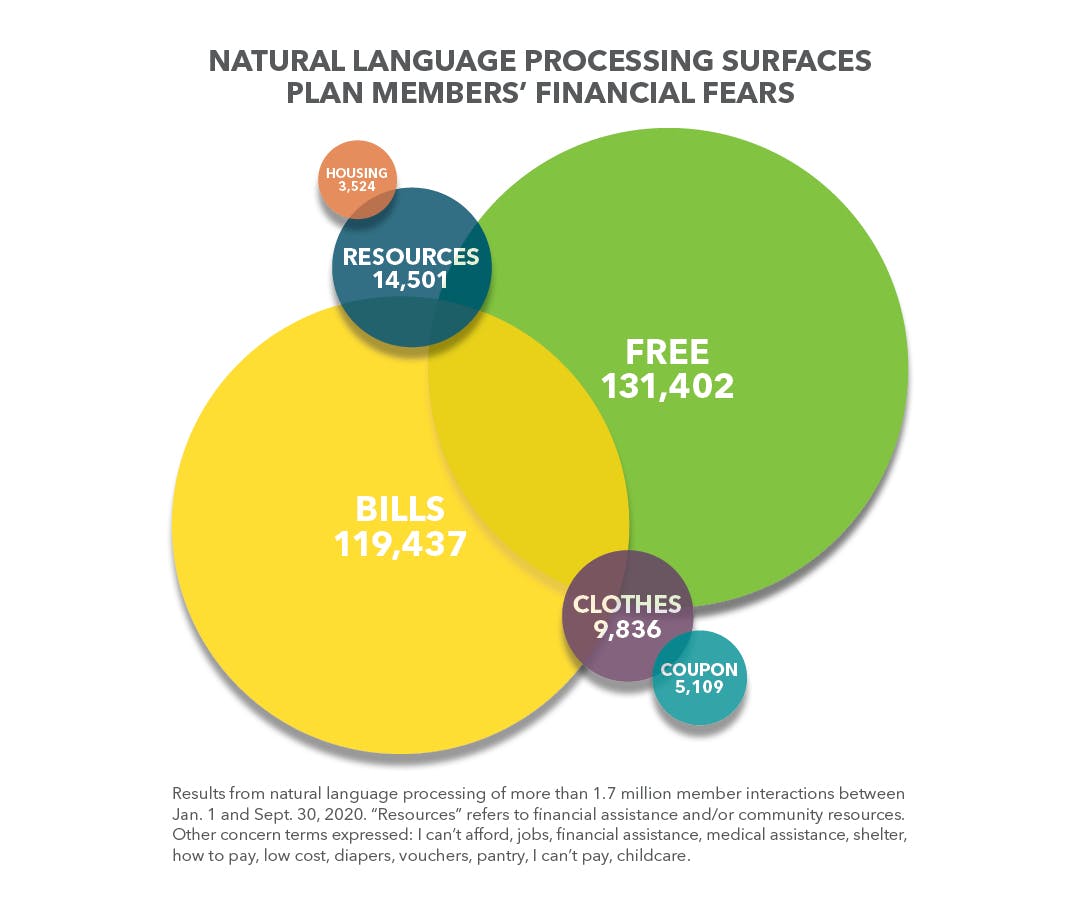We’ve all dialed a toll-free number and heard the familiar message: “This call may be recorded for quality and training purposes.”
At Quantum Health, we convey a similar message when employees and their dependents contact us about benefits. But we then go several steps further. Our data scientists analyze the recordings, searching for insights to help us better understand and address plan members’ needs. We also use the learning to improve our service quality, innovate our information technologies and enhance training of our front-line Care Coordinators.
How do we gain actionable insights from hundreds of thousands of spoken and written interactions? Using natural language processing (NLP), which applies artificial intelligence to extract meaning from unstructured data. Here’s an example to consider in your benefits planning.
Latest NLP analysis reveals consumers’ financial stress
With COVID-19 triggering layoffs, furloughs and other financial challenges for consumers, NLP reveals some of the toll being taken on their household budgets and peace of mind. Analysis of more than 1.7 million plan member engagements this year found that a significant number (nearly 20%) involved members expressing concern about — and seeking help with — affording expenses.
Further analysis showed that their worries included medical and prescription drug charges, but also went well beyond healthcare. Including fears about missing rent and mortgage payments. Finding food assistance. Some voiced concern about keeping their families in clothes and their infants in diapers.
The following chart shows the six most-commonly expressed terms identified by NLP. Footnoted are another 12 that, though not expressed as often, show the variety of money-related worries many employees and families face.

Insights from the front line
What can benefits professionals take away from this analysis? First, community resources matter. To support plan members who are struggling with financial, emotional or life-management issues, we train and equip our Care Coordinators to orchestrate answers and assistance not only from an employer’s benefits plan and point solutions, but also from a toolkit of “community resources.”
Community resources are support programs offered by private sector, public sector and nonprofit agencies. From transportation and financial aid to assistance with food, housing and childcare, these services are an increasingly meaningful supplement to an employer’s benefits strategy. Plan members referred to community resources often express surprise and gratitude at receiving that level of support from their employer’s health plan.
Second, benefits professionals can find the NLP analysis useful as you consider supporting employees’ financial well-being in new ways.
Financial benefits have traditionally focused on programmatic offerings — retirement savings plans, student loan assistance, financial literacy education. Such benefits are most applicable for employees at certain levels of income and financial stability. Also, employees who show interest and participate in these benefits have no reason to feel shame or embarrassment.
By contrast, employees often conceal — from spouses, and certainly from colleagues — the kinds of financial distress revealed by NLP analysis. In fact, some plan members have said our Care Coordinators are the first people with whom they’ve felt comfortable sharing their concerns.
No retirement plan or budgeting app can empathize with a financially distressed consumer stunned by an unexpected healthcare diagnosis or expense, much less guide them to an array of possible solutions — both within and supplemental to their core benefits plan.
In that sense, healthcare navigation and care coordination allow self-insured employers to support employees flexibly, in real time, across a spectrum of financial strains and life challenges that can arise any day, within any employee group.
